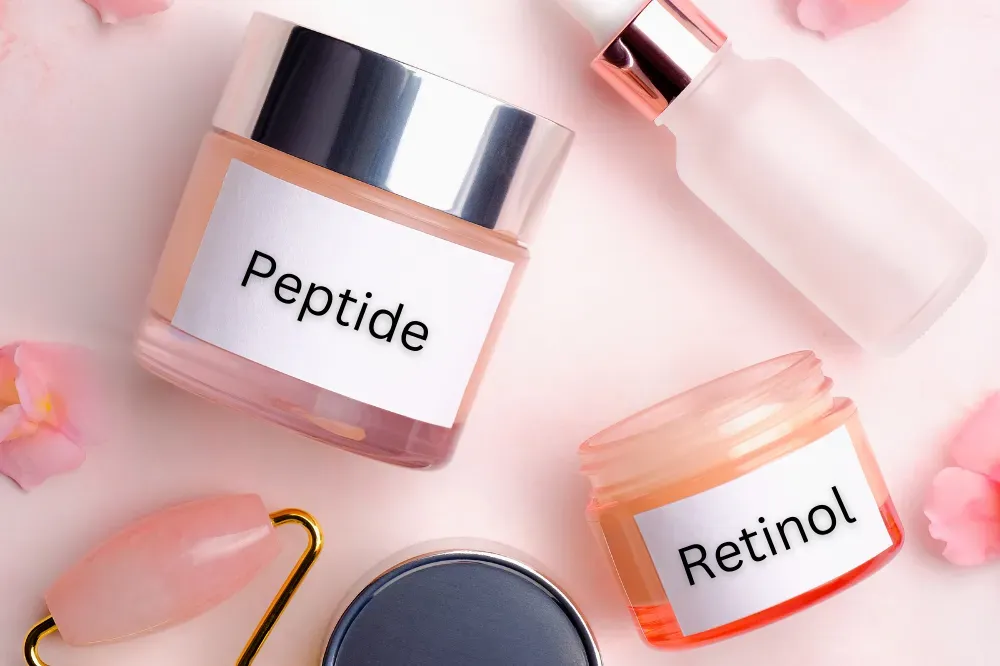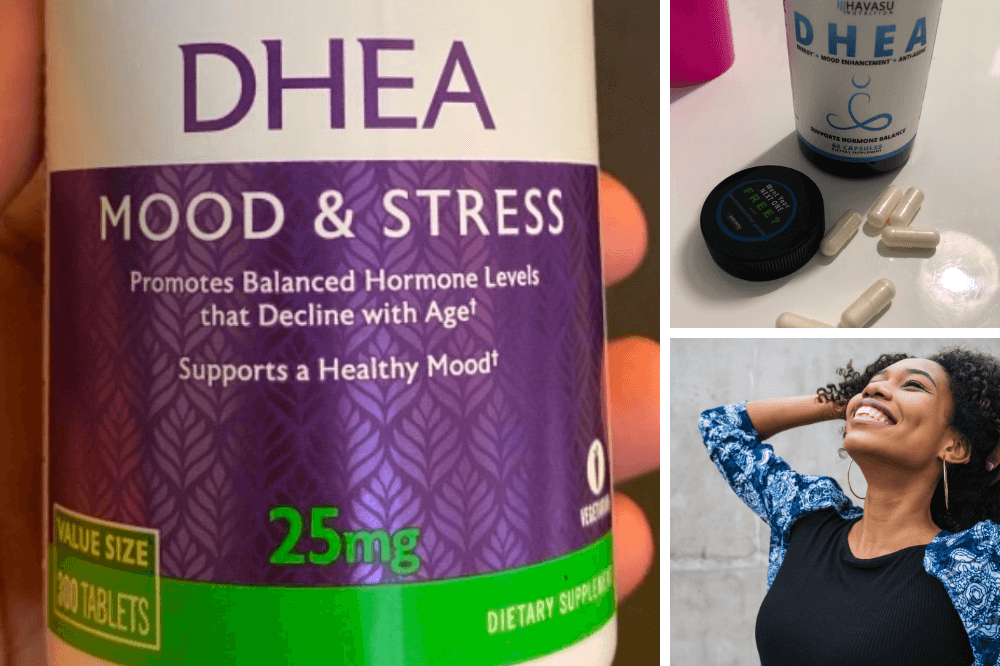I. Introduction

The quest for glowing, healthy skin has led many of us down the path of trying various skincare products, each promising miraculous results. In the midst of this, two ingredients have emerged as favorites among skincare enthusiasts and dermatologists alike - niacinamide and peptides. But which is better: niacinamide or peptide? To answer this question, it's important to understand what each of these potent ingredients offers and how they cater to different skin types.
Skincare is more than a self-care ritual; it's a crucial aspect of maintaining overall health and well-being. A tailored skincare routine can help prevent acne, treat wrinkles, and keep your skin looking its best. Moreover, good skincare habits established early can strengthen and prepare your skin for the effects of aging.
Niacinamide, a form of Vitamin B3, and peptides, short chains of amino acids, are both powerful components that can contribute to a robust skincare routine. They've gained popularity in recent years due to their proven benefits and versatility. However, the effectiveness of these ingredients can vary based on individual skin types and concerns, making it essential to understand their properties before incorporating them into your regimen.
In the following sections, we'll delve into the specifics of niacinamide and peptides, examining their benefits, how they work, and their suitability for different skin types. This will provide you with the knowledge you need to make an informed decision about which ingredient may be better suited to your skincare needs.
II. Understanding Niacinamide
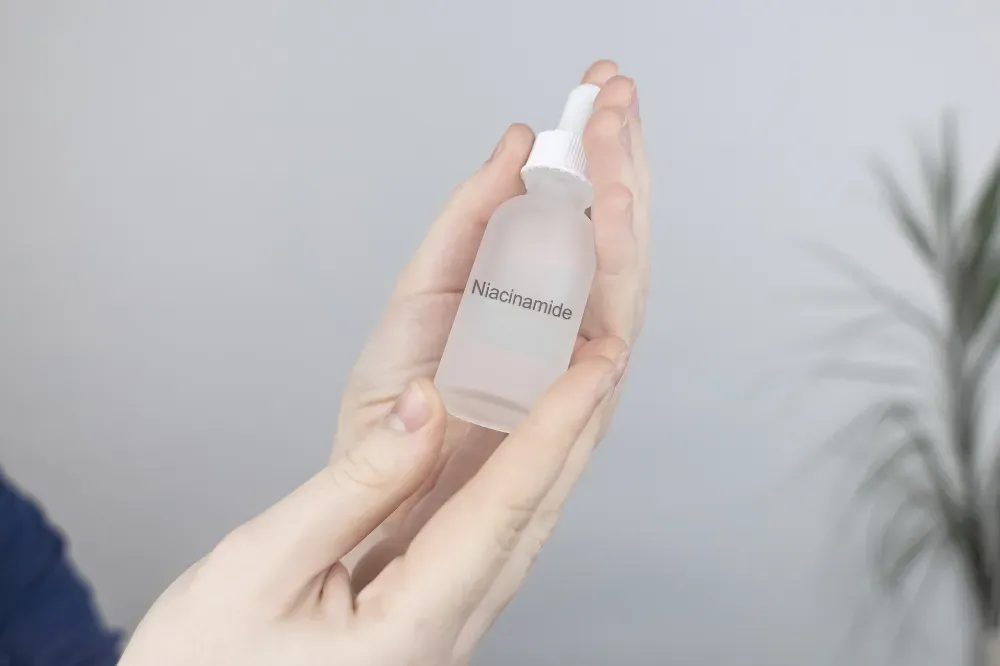
Niacinamide, also known as nicotinamide, is a form of Vitamin B3 that's recognized for its multifaceted benefits for the skin. As a water-soluble vitamin and a powerful antioxidant, niacinamide plays a crucial role in maintaining the health of our skin cells and protecting them against oxidative stress caused by environmental aggressors.
One of the primary ways niacinamide enhances skin health is to improve uneven skin tone. It helps decrease hyperpigmentation by inhibiting the transfer of melanosomes to the skin's surface, resulting in a brighter, more even complexion. Furthermore, it strengthens the skin's protective barrier by increasing the production of ceramides, which are lipids that help retain moisture and protect the skin from damage. This restoration of the skin barrier is particularly beneficial for those with oily or acne-prone skin, as niacinamide can regulate sebum production, resulting in less oil and fewer breakouts.
The benefits of niacinamide extend beyond these functions. It has potent anti-inflammatory properties that can reduce inflammation and redness, making it beneficial for conditions such as rosacea. Plus, its ability to boost collagen production helps reduce the appearance of fine lines and wrinkles, contributing to a more youthful-looking complexion.
Moreover, niacinamide is a formidable ally in the fight against sun damage and premature aging. Studies have shown that it can repair UV-induced DNA damage and reduce immunosuppression caused by sun exposure, effectively preventing the signs of premature aging.
In summary, niacinamide is a versatile skincare ingredient that offers a host of benefits, ranging from improving skin tone and texture to combating aging signs. Its adaptability makes it suitable for various skin types and concerns.
III. Understanding Peptides
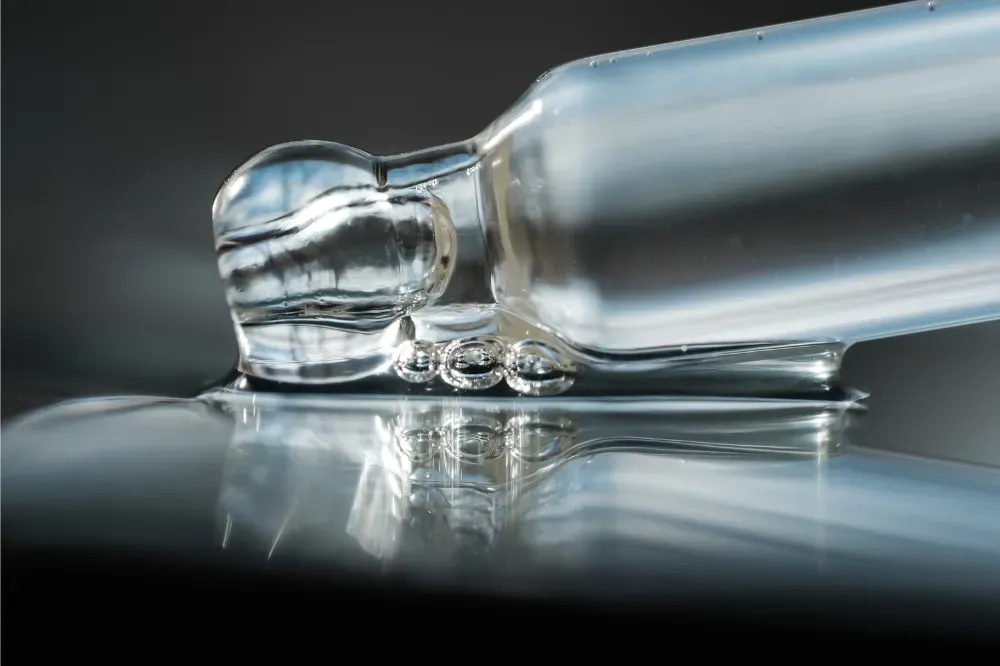
Peptides are short chains of amino acids, which are the building blocks of proteins, such as collagen, in our bodies. In the realm of skincare, peptides have emerged as a key ingredient due to their ability to penetrate the skin and deliver a variety of benefits.
Peptides work by sending signals to our cells to perform specific functions. For example, when collagen breaks down in our skin due to age or environmental factors, it produces specific peptides that signal our skin cells to produce more collagen. By applying peptides topically, we can trick our skin into thinking it needs to produce more collagen, leading to improved skin texture, firmer skin, and softened fine lines and wrinkles.
Neurotransmitter peptides, also known as neuropeptides, play a significant role in collagen production and wound healing. They function by limiting the release of neurotransmitters - the chemicals that our nerves use to communicate. This has a relaxing effect on our facial muscles, reducing the appearance of expression lines and wrinkles.
However, the key to reaping the full benefits of peptides is consistency. Studies show that applying peptides consistently over time can lead to noticeable improvements in skin health and appearance. Therefore, incorporating peptides into your daily skincare routine can provide long-term benefits for your skin.
In conclusion, peptides are powerful skincare ingredients that can enhance skin texture, firmness, and overall appearance. Their versatility and effectiveness make them a valuable addition to any skincare regimen.
IV. Niacinamide vs Peptides: A Comparison
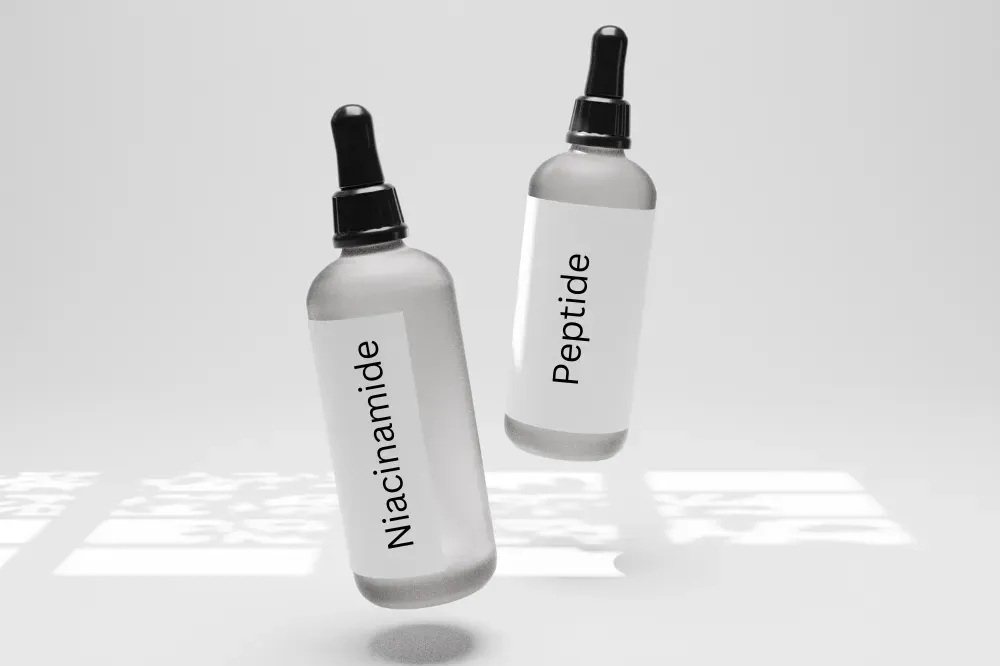
When it comes to skincare, both niacinamide and peptides have plenty to offer. They are both skin-loving ingredients that can provide significant improvements in skin health and appearance. However, their effects can vary based on individual skin type and concerns.
Niacinamide is known for its versatility—it can help with a wide range of skin issues, from uneven skin tone to excess oil production. It's particularly beneficial for acne-prone and oily skin, as it can regulate sebum production and reduce inflammation. On the other hand, peptides are champions at improving skin texture and firmness and reducing fine lines and wrinkles. They stimulate collagen production, leading to firmer, more youthful-looking skin.
Both ingredients are typically well-tolerated and suitable for sensitive skin types. However, as with any skincare product, it's recommended to patch test first to ensure there are no adverse reactions.
Moreover, niacinamide and peptides can work synergistically with other ingredients such as hyaluronic acid, vitamin C, vitamin E, ferulic acid, and alpha hydroxy acids (glycolic acid, lactic acid). For instance, a study revealed that a combination of niacinamide, peptides, and retinyl propionate significantly reduced wrinkles.
Both niacinamide and peptides play a crucial role in protecting the skin from damaging free radicals and sun exposure. Niacinamide has been shown to repair UV-induced DNA damage and reduce immunosuppression caused by sun exposure, while peptides can protect against environmental damage and promote wound healing.
In conclusion, whether niacinamide or peptides are better for you largely depends on your skin type and concerns. Both ingredients bring unique benefits to the table, and using them in combination could potentially provide the best of both worlds.
V. Using Niacinamide and Peptides in Your Skincare Routine

Incorporating niacinamide and peptides into your skincare routine can bring about significant improvements to your skin's health and appearance. However, the way you use these ingredients can greatly influence their effectiveness.
Niacinamide is a versatile ingredient that can be found in various types of skincare products, such as serums, creams, and toners. It's best used after cleansing and toning but before applying moisturizer. On the other hand, peptides are often found in targeted treatments like serums or creams. These should be applied after cleansing and toning, but before heavier creams or oils.
Before incorporating these ingredients into your routine, it's crucial to perform a patch test. Apply a small amount of the product on a discreet area of your skin, like your inner forearm, and wait for 24 hours. If no irritation occurs, you can safely use the product on your face.
Consistency is key when using niacinamide and peptides. Regular use over time can lead to noticeable improvements in skin firmness, tone, and texture. Therefore, it's recommended to incorporate these ingredients into your daily skincare routine.
There are many products on the market that contain niacinamide and peptides. A few recommendations include The Ordinary's Niacinamide 10% + Zinc 1% serum for regulating sebum production, and the Drunk Elephant's Protini Polypeptide Cream for improving skin texture and firmness.
In conclusion, both niacinamide and peptides can be valuable additions to your skincare routine. With consistent use, these ingredients can help address various skin concerns and enhance your skin's overall health and appearance.
VI. Expert Advice

When it comes to choosing between niacinamide and peptides, board-certified dermatologists often suggest that the choice depends on individual skin concerns and needs.
Niacinamide, a form of vitamin B3, has been praised for its versatility and broad-spectrum benefits. It's known to reduce inflammation, regulate oil production, and minimize redness and blotchiness. Moreover, studies have shown that niacinamide can reduce the expression of Matrix Metalloproteinases (MMPs), enzymes that degrade collagen and contribute to aging.
Peptides, on the other hand, are known for their ability to boost collagen production and improve skin texture and firmness. They've been found to synergistically activate the regenerative capacity of skin cells, promoting wound healing and skin repair.
However, regardless of whether you choose to use niacinamide, peptides, or both, dermatologists unanimously agree on one thing: the importance of sunscreen. Sun damage is a primary cause of premature aging, and regular use of a broad-spectrum sunscreen is crucial in any skincare routine.
In conclusion, both niacinamide and peptides offer unique benefits, and your choice between them should be guided by your specific skin concerns and needs. And remember, no skincare routine is complete without adequate sun protection.
VII. Conclusion
Both niacinamide and peptides bring a host of benefits to the table, making it difficult to definitively say which is better. Niacinamide, a form of vitamin B3, has been lauded for its ability to brighten skin, improve skin barrier function, reduce inflammation, and regulate oil production. It's also been shown to provide significant appearance benefits in patients with rosacea.
Peptides, on the other hand, are known for their ability to stimulate collagen production and improve skin texture and firmness. They've even been found to work synergistically with niacinamide and retinyl propionate in reducing wrinkles.
However, the choice between niacinamide and peptides—or the decision to use both—should be guided by your specific skin concerns and needs. It's important to know your skin type and understand what issues you want to address before deciding which ingredient is best for you.
Experimentation is key in skincare. Don't be afraid to try different products and see how they work for your skin. With patience and consistency, you can find the perfect skin care routine that suits your individual needs.
In conclusion, whether you choose niacinamide, peptides, or a combination of both, remember that these ingredients have the potential to significantly improve your skin's health and appearance when used correctly.
FAQs
Q: Are niacinamide and peptides compatible? A: Yes, niacinamide and peptides can be used together in a skincare routine. Studies have shown that a product regimen containing the combination of niacinamide and peptides can be significantly effective in improving skin health.
Q: Can niacinamide and peptides reduce the appearance of wrinkles? A: Yes, both ingredients have been found to reduce the appearance of wrinkles. A study found that a cosmetic product regimen containing niacinamide, peptide, and retinyl propionate was more effective early in the treatment for reducing the appearance of wrinkles as compared to a prescription product.
Q: Do niacinamide and peptides have antimicrobial properties? A: Niacinamide has been found to provide long-lasting protection against bacteria. However, there's no substantial evidence to suggest that peptides share this property.
Q: How do peptides enhance the regenerative capacity of skin cells? A: Peptides are known to activate the regenerative capacity of skin cells. They work synergistically to target both epidermal and dermal repair processes, alone or in combination with niacinamide.
Q: Can niacinamide affect glucose, insulin, and C-peptide levels in the body? A: A study found that niacin increased glucose, insulin, and C-peptide levels in non-diabetic, postmenopausal women. However, it's important to note that the study does not mention topical use of niacinamide in skin care.
Q: Can niacinamide be used with salicylic acid? A: Yes, niacinamide can be used with salicylic acid in a skincare routine. Salicylic acid, an alpha hydroxy acid, is known for its ability to exfoliate the skin and unclog pores. It's particularly beneficial for individuals with acne-prone skin. Meanwhile, niacinamide is recognized for its anti-inflammatory properties and ability to boost the skin's barrier function. When used together, these ingredients can complement each other's benefits, resulting in clearer, healthier skin. However, it's important to carefully layer these ingredients, typically applying salicylic acid first, then waiting about 30 minutes before applying niacinamide. This ensures that each ingredient is able to perform at its best.

